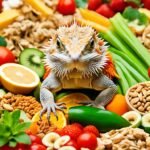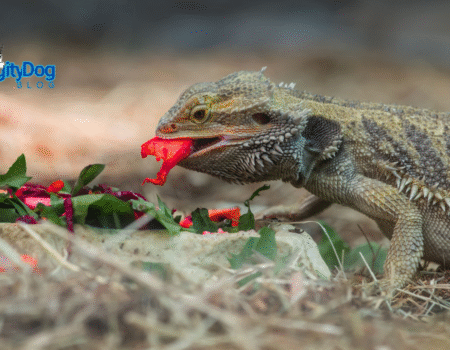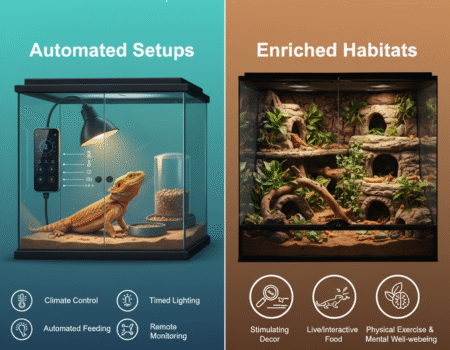“Let food be thy medicine and medicine be thy food.” – Hippocrates
As a proud bearded dragon owner, I always strive to provide the best care and nutrition for my scaly friend. One question that frequently pops up is whether bearded dragons can enjoy the delicious sweetness of bananas. After all, they are packed with nutrients and make a convenient snack for us humans. But what about our reptilian companions?
Today, I’m thrilled to dive into the topic of feeding bananas to bearded dragons and uncover the truth behind this popular query. Join me on this adventure as we explore the nutritional value of bananas, the effects they can have on our reptilian friends, and the guidelines for safely incorporating this tropical fruit into their diet. Together, let’s navigate the world of bearded dragons and bananas to ensure our scaly companions receive the best possible care.
Key Takeaways:
- Bearded dragons can eat bananas, but moderation is key.
- The high phosphorus content and sugar content in bananas can be harmful if consumed in large quantities.
- Regular consumption of bananas can deplete calcium and lead to metabolic bone disease (MBD).
- Bananas should only be fed to bearded dragons once or twice a month.
- A balanced diet for bearded dragons primarily consists of insects, greens, and vegetables.
Why Can’t Bearded Dragons Eat Bananas All the Time?
Bearded dragons, a popular pet reptile, are known for their unique dietary needs. While they can enjoy a variety of fruits and vegetables, feeding them bananas regularly is not recommended. The reason behind this lies in the calcium-phosphorus ratio and the potential risk of metabolic bone disease (MBD).
Bananas have a high phosphorus to calcium ratio, with three parts phosphorus to one part calcium. However, bearded dragons require a balanced ratio of calcium to phosphorus, ideally ranging from 1.1 to 2.1. When bearded dragons consume phosphorus-rich, calcium-low foods like bananas on a regular basis, it can lead to calcium depletion in their bodies and increase the risk of developing metabolic bone disease (MBD).
Metabolic bone disease is a common condition that affects reptiles, including bearded dragons. It results from an imbalance in the calcium and phosphorus levels, causing the bones to weaken and become deformed.
MBD can have severe consequences for the health of bearded dragons, such as pain, difficulty moving, and even paralysis. To prevent this, it’s essential to provide a diet that maintains the proper calcium-phosphorus ratio and promotes overall bone health.
By understanding the potential risks of feeding bananas to bearded dragons on a regular basis, you can take proactive measures to safeguard their health and well-being. It’s crucial to ensure a varied and nutritious diet that includes other fruits, vegetables, and a primary focus on insects as a source of protein.
“Feeding bearded dragons a diet that meets their nutritional needs is essential for their long-term health. While bananas can be an occasional treat, it’s vital to prioritize foods with a better calcium-phosphorus ratio to prevent the development of metabolic bone disease.”
Offering a variety of safe fruits, such as apples (without seeds), blueberries, or melons like cantaloupe or watermelon, can provide your bearded dragon with a more balanced and nutritious diet. Remember to introduce new foods gradually and monitor their overall health and well-being.
In conclusion, while bearded dragons can enjoy the occasional banana as a treat, it is important to limit their consumption due to the adverse effects on their calcium-phosphorus ratio and the potential development of metabolic bone disease. By providing a well-balanced and varied diet, you can ensure the long-term health and happiness of your bearded dragon.
How Can Bearded Dragons Eat Bananas?
When it comes to feeding bananas to bearded dragons, there are a few different ways to go about it. The choice of how to prepare and serve the bananas depends on personal preference and what works best for your dragon.
If you prefer to keep the peel intact, you can slice the banana with the peel on and serve the pieces in the food bowl. This allows the dragon to eat the banana while still getting to interact with the peel, which can provide mental stimulation.
Alternatively, you can peel the banana and then slice it into small pieces before placing them in the food bowl. This eliminates the need for the dragon to navigate around the peel and makes the banana easier to consume.
If you want to provide a more interactive feeding experience, you can even hold up a peeled banana for your bearded dragon to eat. This allows them to enjoy the banana in a more natural “human-style” way.
Ultimately, whether you choose to serve the banana with the peel, without the peel, or hold it in your hand, the most important thing is to ensure that the banana pieces are an appropriate size for your dragon to easily eat and digest.
What to Look Out for When Feeding Bearded Dragons Bananas
When feeding bearded dragons bananas, it is important to watch out for any signs of metabolic bone disease (MBD). MBD can occur when the dragon’s diet is imbalanced, particularly in terms of calcium and phosphorus levels. Symptoms of MBD may include:
- Shaking limbs or tremors
- Softening of jaw and face bones
- Weakness and fatigue
- Stunted growth
- Paralysis
- Swollen rear legs
The presence of these symptoms indicates a calcium deficiency and should be addressed immediately. However, if bananas are fed in moderation (once or twice a month), the likelihood of these symptoms occurring is reduced.
Remember, a balanced diet is crucial for the health and well-being of bearded dragons. Providing the appropriate nutrition and monitoring their diet can help prevent the development of MBD and other health issues.
By paying attention to your bearded dragon’s diet and taking precautions when feeding them bananas, you can contribute to their overall health and happiness.
Other Fruits for Bearded Dragons
While bearded dragons can enjoy the occasional treat of bananas, it is important to provide them with a diverse range of fruits for a well-rounded and balanced diet. Including a variety of safe fruits in their meal plan ensures that they receive essential nutrients and vitamins. Here are some other fruits that are safe for bearded dragons:
- Apples (without seeds): Apples are a nutritious option for bearded dragons. Ensure to remove the seeds as they can be toxic for them.
- Blueberries: These tiny powerhouses of antioxidants can be a healthy and flavorful addition to your dragon’s diet.
- Melons like cantaloupe or watermelon: These refreshing fruits provide hydration and can be a great source of vitamins for your bearded dragon.
When feeding fruits to your bearded dragon, it’s important to remember that moderation is key. Fruits should not exceed the percentage of vegetables and insects in their overall diet. Greens, vegetables, and proteins should make up the majority of their meals for optimal health and nutrition.
Here’s an example of a table comparing the nutritional value of the recommended fruits for bearded dragons:
| Fruit | Nutritional Value |
|---|---|
| Apples (without seeds) | Rich in vitamins A and C, fiber |
| Blueberries | High in antioxidants, vitamins C and K |
| Cantaloupe | Packed with vitamins A and C, hydrating |
| Watermelon | Hydrating, contains vitamins A and C |
Remember, providing a varied and balanced diet is essential for the overall well-being of your bearded dragon. Consult with a reptile veterinarian or an expert in herpetology for specific dietary recommendations tailored to your dragon’s individual needs.
Bananas and Baby Bearded Dragons
When it comes to feeding baby bearded dragons, their nutrition and growth are of utmost importance. It is crucial to provide them with a balanced diet that is rich in proteins and calcium to support their rapid development. While bananas can offer some nutritional benefits, they should be given sparingly as an occasional treat and not as a regular part of their diet.
As baby bearded dragons require a higher intake of proteins for proper growth, their diet should primarily consist of insects such as crickets and mealworms. These protein-packed insects provide essential nutrients that contribute to their overall health and development.
In terms of calcium, it is crucial to ensure they receive an adequate amount to support bone development and prevent any deficiencies. Calcium can be provided through calcium-dusted insects and calcium supplements specifically formulated for baby bearded dragons.
While bananas contain some nutritional value, they should not be the main source of nutrition for baby bearded dragons. The high sugar content in bananas can be detrimental to their health if consumed excessively, leading to potential weight gain and related health issues. Therefore, it is important to include bananas sparingly in their diet, as an occasional treat.
By incorporating a variety of protein-rich insects, calcium sources, and a balanced diet, baby bearded dragons can thrive and grow into healthy adult dragons. Monitoring their nutrition and growth is essential, and consulting with a reptile veterinarian can provide valuable guidance on creating a suitable diet plan for your baby dragon.
How Often Should Bearded Dragons Eat Bananas?
Bearded dragons can enjoy the occasional sweet treat of bananas, but it’s important to maintain a balanced diet for their overall health. Feeding them bananas too frequently can lead to health issues due to the high sugar content and the imbalanced calcium to phosphorus ratio.
I recommend feeding bananas to your bearded dragon once or twice a month. This ensures that they receive some of the nutritional benefits without overloading their system. By keeping their banana consumption limited, you can maintain a balanced diet for your dragon and prevent any potential health problems.
Remember that bearded dragons require a varied diet that consists primarily of insects, greens, and vegetables. This provides them with the necessary nutrients for their growth and overall well-being. Bananas should be an occasional treat rather than a staple in their diet.
By feeding your bearded dragon bananas in moderation, you can strike a balance between their enjoyment of this tropical fruit and their overall nutritional needs. It’s always important to monitor your dragon’s health and consult with a veterinarian if you have any concerns about their diet or well-being.
Feeding your bearded dragon bananas once or twice a month can be a delightful and safe addition to their diet.
Feeding Guidelines for Bearded Dragons
When it comes to feeding bearded dragons, it is crucial to follow proper guidelines to ensure a healthy and balanced diet. The key to keeping your dragon happy and thriving lies in providing a varied and nutritious menu that supports their specific dietary needs.
Here are some essential guidelines to keep in mind:
- Variety is key: Bearded dragons are omnivores, which means they require a mixture of insects, greens, and vegetables to meet their nutritional needs. Offering a diverse range of food options helps provide a well-rounded diet.
- Moderation is key: While fruits, including bananas, can be included in a bearded dragon’s diet, they should be given in moderation. Fruits are high in sugar and should not exceed the percentage of insects and vegetables in their overall diet.
- Weigh and monitor: Regularly monitor your bearded dragon’s weight to ensure they are maintaining a healthy body condition. Overfeeding can lead to obesity and related health issues, so it’s important to provide appropriate portion sizes.
- Seek professional advice: Consult with a reptile veterinarian for specific feeding guidelines tailored to your bearded dragon’s individual needs. They can provide valuable insights regarding portion sizes and help address any concerns about your dragon’s diet.
Remember, a healthy diet plays a critical role in your bearded dragon’s overall well-being. By following these feeding guidelines, you can ensure that your dragon receives the proper nutrition they need to thrive.
| Guidelines | Benefits |
|---|---|
| Offer a variety of insects, greens, and vegetables | Provides essential nutrients and vitamins |
| Moderate the amount of fruits, including bananas | Prevents overconsumption of sugar |
| Weigh and monitor your dragon’s weight | Prevents obesity and related health issues |
| Consult with a reptile veterinarian | Ensures tailored advice for your dragon’s needs |
Can Bearded Dragons Eat Banana Peels?
While bearded dragons can enjoy the flesh of bananas, it is important to avoid feeding them the banana peels. Banana peels are tough to digest and may contain pesticides or other chemicals that could be harmful to your dragon’s health. To ensure the well-being of your bearded dragon, it is recommended to stick to feeding them the flesh of the banana rather than the peel.
If you’re wondering how to properly feed bananas to your bearded dragon, it’s best to peel the fruit and offer them small pieces. Avoid including the tough peel as it can pose digestion challenges for your pet. By providing your bearded dragon with only the edible portion of the banana, you can help prevent potential digestive issues and keep them healthy and happy.
Alternatives to Bananas for Bearded Dragons
If you want to provide variety in your bearded dragon’s diet, there are several alternative fruits to consider. Some safe options for bearded dragons include apples (without seeds), blueberries, and melons like cantaloupe or watermelon. These fruits can be included in the dragon’s diet along with other nutritious foods to ensure a balanced and healthy meal plan.
If you’re concerned about the phosphorus to calcium ratio in bananas or simply want to offer more variety, these alternatives can be a great choice. Bearded dragons can enjoy the sweetness and nutritional benefits of these fruits while maintaining a balanced diet.
When offering fruits to your bearded dragon, it is important to remember that they should only make up a small percentage of their overall diet. Insects, greens, and vegetables should still be the primary components to ensure their nutritional needs are met.
Monitoring Your Bearded Dragon’s Health
As a responsible owner, it’s crucial to monitor the health of your bearded dragon, especially when introducing new foods like bananas into their diet. Observing their reaction after eating bananas can provide valuable insights into their well-being. Pay attention to any changes in their health or behavior, such as unusual lethargy, decreased appetite, or digestive issues.
Regular vet check-ups are also essential for ensuring your bearded dragon’s overall health. A qualified reptile veterinarian can conduct thorough examinations, perform necessary tests, and address any concerns or issues that may arise. They can provide expert guidance on your dragon’s diet, monitor their weight, and offer personalized recommendations to keep them in optimal health. Vet check-ups should be scheduled at least once a year, but more frequent visits may be necessary for younger dragons or those with specific health conditions.
Remember, bearded dragons are unique creatures with individual needs and preferences. While bananas can be included as an occasional treat, it’s essential to ensure their diet remains varied and balanced. Regular monitoring and vet check-ups will help you provide the best care for your beloved pet, promoting their overall well-being and happiness.
Conclusion
In conclusion, bearded dragons can enjoy the occasional treat of bananas as part of a balanced diet. While bananas have some nutritional benefits, it is important to feed them in moderation due to their imbalanced calcium to phosphorus ratio and high sugar content. A varied diet of insects, greens, vegetables, and occasional fruits like bananas is essential for maintaining the overall health and well-being of these fascinating reptiles.
Remember to monitor your bearded dragon’s health closely and follow the recommended feeding guidelines to avoid any potential health issues. Regular vet check-ups are also recommended to ensure that your pet is thriving and to address any concerns or questions you may have.
Providing a balanced diet and proper care will not only keep your bearded dragon healthy but also ensure a happy and thriving companion for years to come. So, go ahead and treat your scaly friend to a small piece of banana, but always remember to maintain a balanced diet for their overall well-being.
FAQ
Can bearded dragons eat bananas?
Yes, bearded dragons can eat bananas, but it should be done in moderation.
Why can’t bearded dragons eat bananas all the time?
Bearded dragons cannot eat bananas regularly due to their high phosphorus to calcium ratio, which can lead to calcium depletion and metabolic bone disease (MBD).
How can bearded dragons eat bananas?
There are various ways to feed bananas to bearded dragons, such as slicing the banana with the peel, slicing the peeled banana, or offering half of an unpeeled banana.
What should I look out for when feeding bearded dragons bananas?
When feeding bearded dragons bananas, it is important to watch out for any signs of metabolic bone disease (MBD), such as shaking limbs, weakness, and swollen rear legs.
Are there other fruits that are safe for bearded dragons?
Yes, other safe fruits for bearded dragons include apples (without seeds), blueberries, and melons like cantaloupe or watermelon.
Can baby bearded dragons eat bananas?
Baby bearded dragons should have a diet that is higher in proteins and calcium for proper growth, so bananas should be given sparingly as an occasional treat.
How often should bearded dragons eat bananas?
Bearded dragons should only eat bananas once or twice a month to avoid health issues caused by the high sugar content and imbalanced calcium to phosphorus ratio.
What are the feeding guidelines for bearded dragons?
Bearded dragons should have a balanced diet consisting of a variety of insects, greens, vegetables, and occasional fruits like bananas. Regular vet check-ups are recommended.
Can bearded dragons eat banana peels?
It is best to avoid feeding bearded dragons banana peels as they can be tough to digest and may contain harmful chemicals or pesticides.
What are the alternatives to bananas for bearded dragons?
Safe alternatives to bananas for bearded dragons include apples (without seeds), blueberries, and melons like cantaloupe or watermelon.
How should I monitor my bearded dragon’s health?
Observe your bearded dragon’s reaction to new foods like bananas, watch for any changes in health or behavior, and schedule regular vet check-ups to ensure their overall well-being.
Is there a conclusion to this topic?
In conclusion, bearded dragons can eat bananas, but it should be in limited quantities as part of a balanced diet that includes insects, greens, vegetables, and other fruits.










No Comment! Be the first one.